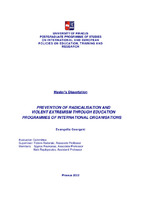Prevention of radicalisation and violent extremism through education programmes of international organisations

Master Thesis
Συγγραφέας
Γεωργάκη, Ευαγγελία
Georgaki, Evangelia
Ημερομηνία
2022Επιβλέπων
Ασδεράκη, ΦωτεινήAsderaki, Foteini
Προβολή/
Λέξεις κλειδιά
Εκπαίδευση ; Διεθνείς οργανισμοί ; Πρόληψη ; Ριζοσπαστικοποίηση ; Βίαιος εξτρεμισμός ; Ψυχική ανθεκτικότηταΠερίληψη
Η παρούσα διπλωματική εργασία εξετάζει την υπάρχουσα πολιτική των Διεθνών Οργανισμών για την Πρόληψη της Ριζοσπαστικοποίησης και του Βίαιου Εξτρεμισμού (ΠΒΕ) μέσω της Εκπαίδευσης χρησιμοποιώντας την θεωρία του συμπλέγματος καθεστώτων. Βασίζεται στην συγκριτική μελέτη των πολιτικών πέντε Διεθνών Οργανισμών και μερικών από τα εξειδικευμένα όργανά τους: 1) τον Οργανισμό Ηνωμένων Εθνών (ΟΗΕ) και 1.α) την Εκπαιδευτική, Επιστημονική και Πολιτιστική Οργάνωση Ηνωμένων Εθνών (UNESCO) και 1.β) το Πρόγραμμα Ανάπτυξης Ηνωμένων Εθνών (UNDP), 2) την Ευρωπαϊκή Ένωση (ΕΕ) και 2.α) το Δίκτυο Ευαισθητοποίησης για την Ριζοσπαστικοποίηση (RAN), 3) το Συμβούλιο της Ευρώπης (ΣτE), 4) τον Οργανισμό Οικονομικής Συνεργασίας και Ανάπτυξης (ΟΟΣΑ) και 5) την Διεθνή Τράπεζα (ΔΤ).
Η εργασία προέκυψε με στόχο να καλύψει την ανάγκη παροχής στους εκπαιδευτικούς και σε άλλους ερευνητές μίας εμπεριστατωμένης κατανόησης της εξέλιξης των πολιτικών των Διεθνών Οργανισμών, οι οποίες εμπλέκουν την εκπαίδευση στην Πρόληψη της Ριζοσπαστικοποίησης και του Βίαιου Εξτρεμισμού και μίας παρουσίασης του σκεπτικού που βρίσκεται πίσω από τις παρεμβάσεις και τα προγράμματα που εκπορεύονται από τους Διεθνείς Οργανισμούς και είναι ειδικά σχεδιασμένα για να εφαρμοσθούν στα σχολεία.
Μετά από μία συνοπτική παρουσίαση του ιστορικού πλαισίου, μία επισκόπηση των κρίσιμων για την μελέτη όρων αποκαλύπτει την έλλειψη συναίνεσης σχετικά με τους ορισμούς που δίνονται από τους διάφορους παράγοντες που ασχολούνται με την Πρόληψη της Ριζοσπαστικοποίησης και του Βίαιου Εξτρεμισμού. Η εργασία αυτή επιχειρεί να εντοπίσει τη χρονική στιγμή όταν η εκπαίδευση μπήκε στο πεδίο ενδιαφέροντος των πολιτικών των Διεθνών Οργανισμών για την Καταπολέμηση του Βίαιου Εξτρεμισμού και την Πρόληψη της Ριζοσπαστικοποίησης και του Βίαιου Εξτρεμισμού. Η συζήτησή μας είναι κυρίως για τον ρόλο που ανατίθεται στην εκπαίδευση για την Πρόληψη του Βίαιου Εξτρεμισμού από τους Διεθνείς Οργανισμούς και πώς αυτός έρχεται σε αντίθεση με τις βασικές αρχές και αποστολή της εκπαίδευσης. H εργασία καταλήγει με προτάσεις για περαιτέρω έρευνα και δράσεις.


